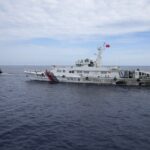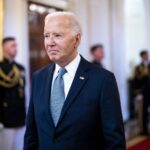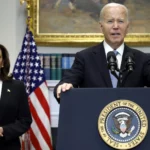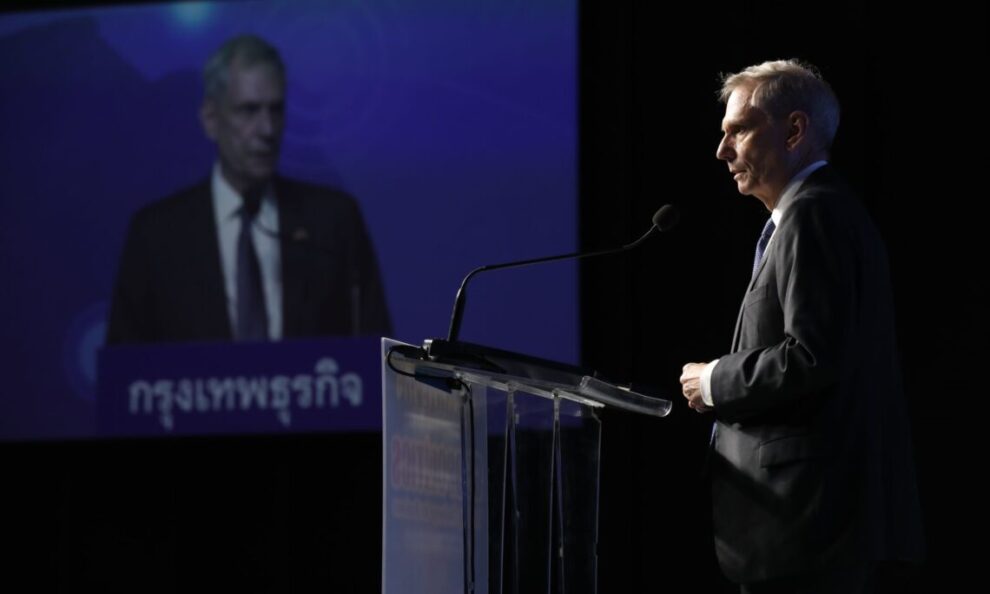Vice Minister, Chairman and CEO of the Nation Group, Managing Editor of the Nation Group, ladies and gentlemen, Sawasdee Khrap!
It is a great honor to be here today. So I want to say thank you for the very kind invitation. I especially want to thank Krungthep Turakit for convening this seminar and for facilitating this exchange of views. So again, and on behalf of the U.S. Embassy and myself, thank you.
U.S. Priorities – Building Partnerships for Peace and Prosperity
One truth is clear: The United States is committed to the Indo-Pacific region, and to our strong alliance with Thailand. For nearly two centuries, the Thai-U.S. partnership has been a force for good and a pillar of Indo-Pacific peace and prosperity. On March 23, 1833, Chao Phraya Phra Khlang and U.S. Minister Edmund Roberts signed the Treaty of Amity and Commerce between Siam and the United States, beginning what is now 190 years of growing partnership between our countries. Today I will outline the U.S. vision for the region and our hopes for the future of the Thailand-U.S. partnership.
Responding to Global Opportunities and Challenges
Right now, we have extraordinary opportunities to make the lives of people better across the globe. Opportunities to create and share wealth, improve access to education and health care, enhance security, and ensure people can make their own decisions about how they are governed. Of course, along with these opportunities, we face challenges, including the fight against COVID-19 and preparing for future global health emergencies, recovering from economic shocks, taking on the threat of climate change, and creating an energy future that’s cleaner, more secure, and more affordable. No country can realize these opportunities or meet these challenges alone. We can only do so together, and our shared set of rules and institutions provides the framework for progress.
The United States will work with our partners, friends, and allies to tackle shared challenges and seize common opportunities.
When countries reject the international rules, however, we must stand together. Hence, the international community has stood squarely with Ukraine against President Putin’s unprovoked and unjustified war. And we work with our partners to promote justice and accountability in Burma and to end the military regime’s brutal campaign of violence against the people of that country. Our future depends on our willingness to work together and to respect international norms and agreements. Respect for international rules provides people and businesses with the stability and predictability to invest and grow.
As I know, it is also on the minds of many here, I would also like to mention our complex and consequential relationship with the PRC, which includes aspects of cooperation as well as competition. Secretary Blinken will soon travel to China to follow up on President Biden and President Xi’s open, candid conversation in November. We seek to keep the lines of communication open and to cooperate where we can, and to make every effort to prevent competition from veering into conflict. Let me reassure you, we are committed to managing this important relationship responsibly.
Our Vision for the Region: U.S. Indo-Pacific Strategy
For over 75 years, the United States and Thailand have supported an Indo-Pacific vision where rules are developed transparently and applied fairly; where countries are free to make their own sovereign decisions; where goods, ideas, and people flow freely across land, sky, cyberspace, the open seas, and good governance is responsive to the people. This system has improved the quality of life for millions of people in this region and across the globe. Every country in the world and every person in this room has benefitted from it.
One new U.S. regional initiative is the Indo-Pacific Economic Framework or IPEF. We are pleased that Thailand was a founding member of IPEF when it was launched in May 2022. We need new solutions to address 21st Century challenges – from trade, to supply chains, to energy, and the environment – and IPEF will help us find them. IPEF will unlock enormous economic value for this region, especially for small businesses.
The Asia-Pacific Economic Cooperation forum (APEC) is another vital initiative to address regional challenges and that helps provide an institutional framework for progress. I commend Thailand for successfully hosting APEC in 2022 and its effort to promote sustainable economic growth via the Bangkok Goals on the Bio-Circular Green Economy model. In 2023, the United States will host APEC and we will strive to build on Thailand’s great work and the overarching goal of promoting free, fair, and open trade and investment, and advancing inclusive and sustainable growth.
U.S.-Thailand Relations – A Model for Regional Partnership
Thailand is central to the future of this region and, as I said earlier, our relations today are strong. Our ties form a tapestry that each of us is weaving, and its threads are government to government, business to business, university to university, and people to people.
Our economic partnership is an essential strand of our tapestry. The United States is Thailand’s largest export market. That means our economies are inextricably linked and our trade relationship is robust. And growing. In fact, our bilateral trade has jumped 50 percent over the past two years. The United States is a major investor in the Thai economy, with U.S. firms operating across diverse sectors including automobiles, healthcare and high tech/digital. U.S. firms’ operations in Thailand are estimated to directly employ nearly 200,000 Thai citizens and support countless other jobs.
The importance of our economic ties can be seen in the engagement we have had over the last year and that we have on the horizon. In March, Bangkok will host Trade Winds, the largest U.S. government-led trade mission and business development forum. The forum will feature Thailand as its regional hub and include optional spin-off visits to five other ASEAN countries. Trade Winds will host well over 100 top executives from U.S. companies and feature meetings with officials, demonstrating the American private sector’s enthusiasm for investing in Thailand. Trade Winds is yet another example of the U.S. commitment to Thailand and our desire to achieve sustainable and inclusive economic growth across the region.
The United States and Thailand are also collaborating on digital economic development to promote innovation, including in developing secure and stable digital infrastructure, enhancing the digital skills of our workforces, and developing smart cities and policies promoting digital trade. Key U.S high tech firms including Seagate, Amazon, Tesla, Ford, Netflix, Google and others are all expanding their operations in Thailand to the tune of billions of dollars in near term investment. These major private industry tech giants are investing in the future of the Thai-U.S. partnership and looking to Thailand as a regional hub.
The United States and Thailand also work closely on the central challenge of our time: climate change. We applaud Thailand’s ambitious target of reducing greenhouse gas emissions by 40 percent by 2030, and the United States is supporting Thailand’s efforts to achieve this goal through a combination of technical assistance, capacity building, and commercial engagement and collaboration.
In health care, for over 60 years Thailand and the United States have been partners. As a result of our shared efforts, the lives of hundreds of millions of people across the globe are better. The close nature of this partnership – for example, our Centers for Disease Control has more than 100 staff co-located in Thailand’s Ministry of Public Health – has saved the lives of countless children and ensured parents can work and take care of their families. During the height of the global pandemic, our vaccine and other donations – and technical cooperation –ensured that safe and effective mRNA covid vaccines got into the arms in Bangkok and across Thailand, that residents of Khlong Toei had access to critical medical supplies, and public hospitals in Kanchanaburi had lab equipment.
Future of U.S.-Thai Relations and Opportunities for Partnership
As you can see, Thailand and the United States have been hard at work building a strong and diverse relationship over the past 190 years. This year, as we celebrate those 190 years, we should look for ways to do even more together, to weave an ever more beautiful tapestry. Together, in fact, I believe we should launch a decade of work to take our relations to a new level. We should seek new ways to increase trade and investment, in both directions, and build prosperity for everyone. We can strengthen engagement in the digital world and in the creative industries. There are opportunities for us to cooperate to expand use of clean energy and put satellites in space. We should increase the number of scholarships for Thais to study in the United States, and for Americans to study here. We can work to accelerate joint scientific and technical research, whether by universities or companies. What we can do is only limited by our imagination.
In conclusion, the United States is committed to enhancing peace and prosperity in the Indo-Pacific, and to our partnership with Thailand. We are actively working with our partners, friends, and allies to tackle shared challenges, seize common opportunities, and to support the international system that has improved life for people across the world. Together, we can build a better future for Thais, Americans, and for people everywhere.
Source: US Embassy















